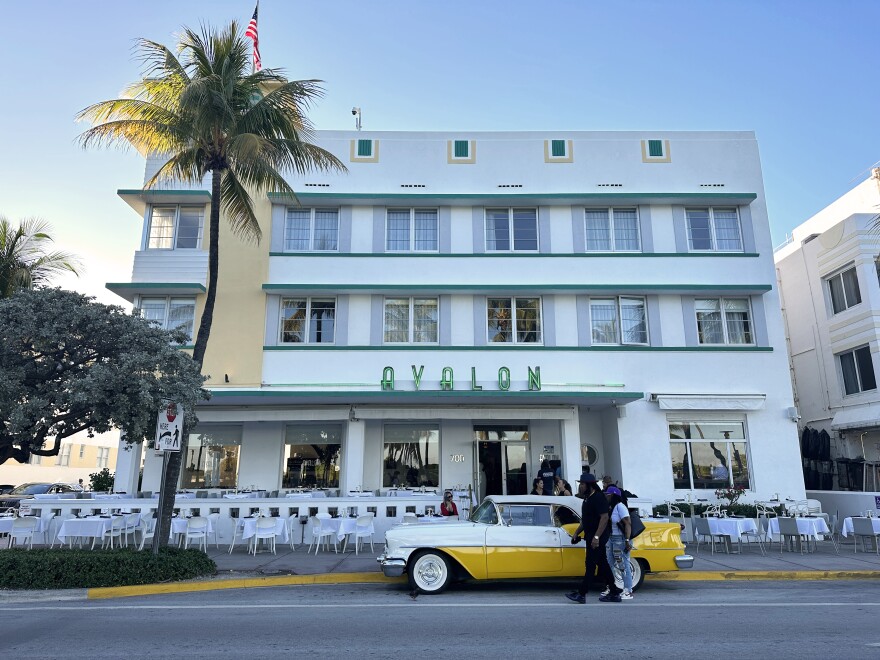Preservationists are breathing a sigh of relief after legislation that threatened to demolish historic structures in coastal areas in Florida — regardless of any local designations — was abandoned in the Florida Legislature this week.
“In March, these bills came out of nowhere and put Florida's most beloved historic communities at risk,” Daniel Ciraldo, executive director of the Miami Design Preservation League, wrote in a statement to WLRN. "We are thankful that common sense has prevailed, and we look forward to continued engagement with stakeholders to protect and fortify Miami Beach and Florida's coastal communities from the impacts of climate change.”
St. Augustine Mayor Nancy Sikes-Kline said she feels relieved that these bills didn't make it.
"It would have created more problems than solutions," she told WLRN via email. "Many thanks to all those who had the insight to see the destructive effect it would have had on our state's historic coastal communities and rallied to defeat it."
READ MORE: Bill threatens hundreds of Florida's historic buildings with demolition
This came after opponents, including officials from cities like Palm Beach and St. Augustine, spoke up against the legislation that would have allowed any building to come down so long as it stood in high-risk coastal flood zones mapped by the Federal Emergency Management Agency and didn't meet the agency's requirements for new construction. That would include the majority of historic buildings up and down the state, especially the hundreds of Art Deco structures in Miami Beach. Properties in historic districts would not have been protected except for any individually listed in the National Register of Historic Places.
Senate Bill 1346 and House Bill 1317 received support from Republicans and Democrats, and made it out of the Senate with some amendments, like exclusions for buildings 200 years and older, but didn't get debated on the House floor.
Opponents feared the measure would allow hundreds of Art Deco and Miami Modern buildings in Miami Beach to be torn down, destroying the character of cities and hurting the tourism economy.
"Losing this district means losing the attraction that brings that tourism to Miami Beach, to the Art Deco district," said Miami Beach Commissioner Alex Fernandez in an interview with WLRN after the measure passed in the Senate in April. "That right there would end up impacting our businesses, would end up impacting employment opportunities and sales revenue to Tallahassee."
The measure even got attention well outside the state. The National Trust for Historic Preservation sent out a statement urging people to contact elected officials to ask them to vote against it.
"Florida’s historic districts are irreplaceable architectural, historical, and community treasures," the National Trust wrote. "Countless private property owners have invested in the rehabilitation of historic buildings in these districts and helped revitalize local economies. For decades, preservation organizations, commission members, architects, developers, and city staff have helped plan and implement successful development projects in historic districts."
Critics also feared this legislation would encourage what's known as demolition by neglect — when an owner of a property avoids costly repairs to a building until a building official deems it too unsafe for public use.
When the Deauville Beach Resort — a Miami Modern building built in 1957 — was imploded last November, preservationists accused the owners of abandoning the hotel until it had to get demolished. They had shut it down in 2017 after an electrical fire and later, water damage caused by Hurricane Irma. Despite efforts in court from Miami Beach officials to get the owners to repair it, a judge ruled it had to be demolished due to a public safety risk.
The legislation would have excluded any historic structures listed by name in the National Register of Historic Places. Miami Beach, however, has fewer than 10.
The bill is expected to return in 2024.
The bill sponsor in the House, State Rep. Spencer Roach, has said he plans to reintroduce the measure next session.
READ MORE: After Deauville implosion, property's future remains uncertain
Copyright 2023 WLRN 91.3 FM. To see more, visit WLRN 91.3 FM.




